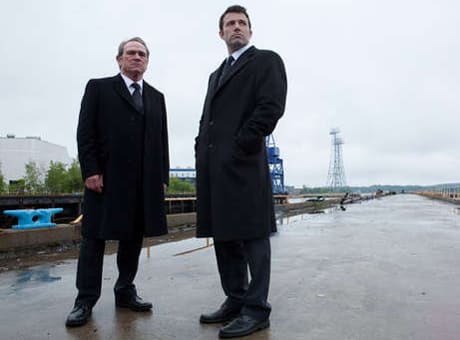When it comes down to it, a great deal of one's appreciation for West Wing writer John Wells's examination of vocation as identity during economic crisis, The Company Men, has much do with how much empathy they can garner for a privileged, rich, white man's struggle with being unable to afford a country club membership.
I mean, I'm sure it's a real challenge for someone to go from doing unnecessary home renovations every two months to show the neighbours how successful they are to being cognizant of a budget and only buying things that they need, but in the grand scheme of things, it's funnier than it is depressing for anyone outside that box.
To clarify, the country club example is actually a major plot point, when recently downsized Bobby Walker (Ben Affleck) rants to his substantially more pragmatic wife Maggie (Rosemarie DeWitt) that projecting the image of success is vital, she counters with homelessness and starvation. He scoffs at his brother-in-law, Jack's (Kevin Costner), offer to hire him in the construction world, convinced that any job with less than a $100K salary is beneath him.
Fortunately, this low-key melodrama has secondary storylines with more identifiable plights, such as that of Bobby's similarly laid-off colleague, Phil Woodward (Chris Cooper), whose job prospects are substantially more limited when pushing 60. His depression gives the story some clout and ties into the Gene McClary (Tommy Lee Jones) narrative, which questions the ethics of cutting loose lifetime employees to save a company or boost stock prices.
This latter thematic vein is substantially more interesting, deconstructing a culture that purports job title and salary as identity signifiers, hinting at the arbitrary nature of it all. But this sagaciousness is minor in comparison to the leap of faith taken in expecting audience investment in the quibbles of ersatz millionaires.
Fortunately, Wells takes his time developing his characters, focusing on logical human drama and responses, allowing us to ignore the elephant in the room. He even avoids tired clichés like the romanticizing of blue-collar work or the optimistic assertion that lost employment is merely an opportunity to find oneself. This makes it easier to digest what is essentially an adequate soap opera with above-average performances and a rickety, myopic core.
(Alliance)I mean, I'm sure it's a real challenge for someone to go from doing unnecessary home renovations every two months to show the neighbours how successful they are to being cognizant of a budget and only buying things that they need, but in the grand scheme of things, it's funnier than it is depressing for anyone outside that box.
To clarify, the country club example is actually a major plot point, when recently downsized Bobby Walker (Ben Affleck) rants to his substantially more pragmatic wife Maggie (Rosemarie DeWitt) that projecting the image of success is vital, she counters with homelessness and starvation. He scoffs at his brother-in-law, Jack's (Kevin Costner), offer to hire him in the construction world, convinced that any job with less than a $100K salary is beneath him.
Fortunately, this low-key melodrama has secondary storylines with more identifiable plights, such as that of Bobby's similarly laid-off colleague, Phil Woodward (Chris Cooper), whose job prospects are substantially more limited when pushing 60. His depression gives the story some clout and ties into the Gene McClary (Tommy Lee Jones) narrative, which questions the ethics of cutting loose lifetime employees to save a company or boost stock prices.
This latter thematic vein is substantially more interesting, deconstructing a culture that purports job title and salary as identity signifiers, hinting at the arbitrary nature of it all. But this sagaciousness is minor in comparison to the leap of faith taken in expecting audience investment in the quibbles of ersatz millionaires.
Fortunately, Wells takes his time developing his characters, focusing on logical human drama and responses, allowing us to ignore the elephant in the room. He even avoids tired clichés like the romanticizing of blue-collar work or the optimistic assertion that lost employment is merely an opportunity to find oneself. This makes it easier to digest what is essentially an adequate soap opera with above-average performances and a rickety, myopic core.
